Quad-Cities Music Teacher Part of Worldwide Virtual Choir
Lynne Stukart of LeClaire can’t sing the praises of a staggeringly huge virtual choir loudly enough. But that makes sense, since for Eric Whitacre’s Virtual Choir 6 – with 17,562 singers from 129 nations – they literally were told to “Sing Gently.”
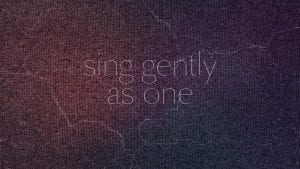
A screen shot showing several of the 17,000-plus participants.
At a time when we could all use some peace, togetherness and harmony, Stukart, a veteran flute teacher, was thrilled to be part of the online musical project. She’s a big fan of Whitacre, the popular choral composer and his ambitious virtual choirs – a project that started in 2010 with individual videos from 185 singers from 12 countries, blended to perform a piece of his in perfect harmony. Previously, he’s done five of the virtual choirs (performing existing pieces), each one bigger than the last.
Stukart saw on Facebook this spring that Whitacre was seeking entries for a sixth, a mesmerizing new piece he penned the lyrics to, “Sing Gently.” Aptly, during the global Covid-19 pandemic, when people can’t gather to sing together, his verses say: “May we stand together, always. May our voice be strong, may we hear the singing, always, and may we always sing along, sing gently, always, sing gently as one.”
About 40,000 people signed up to get the free music to the new piece, and over 17,000 recorded their individual three-minute video from home, singing to video of Whitacre conducting and piano accompaniment, Stukart said recently.
“I’m sure that the pandemic played a huge role in the numbers as well, because so many people don’t have that outlet to sing with others right now,” she said.
Stukart, who has sung in many choirs, performed the alto part, among 6,414 altos, 6,262 sopranos, 2,209 tenors, 2,671 basses, and 16 who did sign language. She found the whole experience very inspiring and affecting.
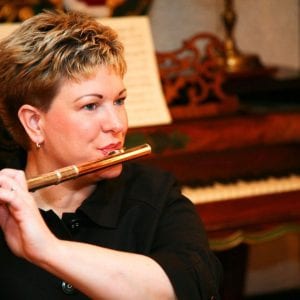
Lynne Stukart is head of the QC Flute Association.
“Right now, so many people are reaching to one another and how we can share this video with one another. His whole message was healing – music is joy, music is joyful, it’s community, it’s comfort,” she said.
Each of the 17,000-plus videos was listened to separately and merged to create a seamless whole. Stukart first saw the finished video July 19, when it was released to the world, with seven minutes listing all the participants, following the piece.
“It’s stunning. As I listened to it, on full stereo, I had goosebumps,” she said. “I was really struck by the generosity of Eric and his team, how much so many people use music as comfort and joy, and also can reach one another when we’re supposed to be keeping distance.”
She said the project revealed a sympathetic side of humanity, true camaraderie, needed right now more than ever, when so many things are so off.
“We have a lot going on worldwide, especially in our country, but it shows you there is goodness, there is kindness, there is compassion, and music really brings the best of all that together.”
People shared personal stories on the group’s Facebook page, about their struggles and triumphs. “There were people in the group, some of it was really heartwarming, or they’re going through some rough experiences, and not just Covid,” Stukart said. “One person had lost his home, but somehow found a way to sing and submit a video. Music is a lifeline.”
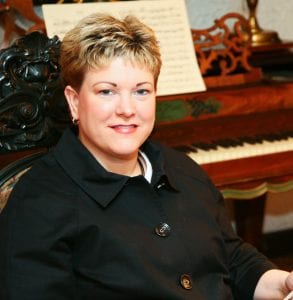
Lynne Stukart
“In the choir there are people from all different walks of life. Some people are going through rough things. And that was pre-pandemic. You throw the pandemic in there and it becomes terribly complicated,” she said.
“For me as a musician, it’s a frequency we send out, and all of us contributed to share that with musicians and people across the globe,” Stukart said. “The camaraderie that was formed in those groups was wonderful. The people that would respond to one another in a kind way, to help each other, was truly beautiful to witness.”
On July 21, Vicky Moreno posted on the choir’s Facebook page:
“I fail to express the immense gratitude that I feel towards each of the people who have made this incredible phenomenon of SING GENTLY possible. I can feel the joy and the rest of everyone contemplating now the great finished work. My sincere congratulations for so much ability to organize, work and create beauty, with such excellent results!”
“For me it has been a unique and unforgettable experience. I have not been able to stop crying every time Eric has sent us one of his precious messages or every time one of you has given us the account of his emotions or life experiences. I have enjoyed every day this endearing group of people and the brotherhood in diversity that is shown here, so rare among strangers.”
Whitacre was inspired to form the virtual choirs in 2009, when a teenage fan recorded herself singing the soprano line from one his pieces and posted it on YouTube. He thought: What if he could get several singers to record themselves in their rooms, doing one of his pieces in the same tempo and key, then stitch them together and make a virtual choir?
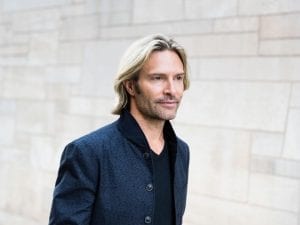
Eric Whitacre
“When I look at the numbers and, more so when I look at the faces of the people from around the world, I’m just stunned,” Whitacre told NPR recently.
Widely considered to be the pioneer of virtual choirs, Whitacre created his first project as an experiment in social media and digital technology in 2010, “Virtual Choir 1: Lux Aurumque.”
That same year, in April 2010, the Augustana College Choir performed Whitacre’s “Cloudburst” in Chicago’s Orchestra Hall, with the Chicago Symphony Orchestra, celebrating the college’s 150th anniversary.
A “Deep” experience out of this world
In 2018, Whitacre’s last virtual choir was created with 8,000-plus singers from 120 countries, for “Deep Field,” used in the soundtrack for a film about the Hubble Space Telescope — the original inspiration for the piece. “Deep Field: The Impossible Magnitude of Our Universe,” the film, premiered with a special screening at Cape Canaveral, Fla., with Whitacre in attendance.
The piece originally premiered in 2015 with the Minnesota Orchestra. NASA’s John Grunsfeld contacted Whitacre after those concerts. Grunsfeld, who was associate administrator of the space agency’s Science Mission Directorate at the time, is an accomplished scientist and astronaut, with several space shuttle missions to the Hubble Space Telescope among his achievements.

“Deep Field” was inspired by the Hubble Space Telescope.
“I felt incredibly humbled by his kind words about my piece, Deep Field, and it was thrilling that he enabled the opportunity for us to work with the Space Telescope Science Institute to create brand new imagery from Hubble — images of the cosmos we’ve never seen before,” Whitacre said in 2018 for classicalmpr.com.
“Deep Field is a largely orchestral piece, but for the moment of revelation, the epic climax of the piece when we first see the Deep Field, the choir joins. In the film and soundtrack, not only do we have the Eric Whitacre Singers but Virtual Choir 5,” with voices aged 4 to 87, the composer said. “How beautiful is that? We’ve been calling it the Earth Choir!”
In a video discussing “Sing Gently,” Whitacre recalled the sudden shutdown of society in March, including choirs no longer allowed to sing.
“I was just stunned. I couldn’t believe what I was seeing, that all of society as I knew it was coming to a grinding halt,” he said. “And with what we all do as singers – suddenly, we were being branded as super-spreaders. The very thing that we love so much – getting together in a room and singing – was a dangerous thing.”
“I couldn’t wrap my head around this, that something as beautiful and benign as singing was a threat.”
“If there was ever a time for a virtual choir, I think it’s now,” Whitacre said. “When else do we have this time, when people have this need to come together and sing, and make something beautiful?”
While he always used older pieces for virtual choirs, he wanted to say something original this time, of this moment. Typically, Whitacre doesn’t write the words. “In this case, it was so specific what we wanted to say and what we wanted to do, that I would write my own words,” he said.
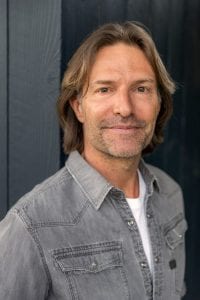
Eric Whitacre while conducting “Sing Gently”
He wrote with the hope that it “might give some small measure of comfort for those who need it, and that it might suggest a way of living with one another that is compassionate, gentle, and kind,” according to a synopsis.
In a CBS Sunday Morning interview the day “Sing Gently” premiered, he said: “The downsides of virtual choirs are legion. A virtual choir is this gorgeous, delicate, ephemeral artwork. And what’s beautiful about it is that it will exist for all time. But singing together in a room, taking that first breath together, and then singing together, I mean, nothing beats that, and nothing ever will.”
Stuck at home, finding the time
While Stukart loves to sing, she’s made her career with flute. Founder and president of the Quad City Flute Association, she earned her master’s in music performance from the University of Akron and spent several years working in Ohio. She’s performed throughout the U.S. and Europe.
She has appeared with many orchestras, including the Akron Symphony Orchestra, Canton Civic Opera, Dubuque Symphony Orchestra, Galesburg Symphony Orchestra, Quad City Opera Orchestra and the Quad City Symphony Orchestra.
In the Q-C, she teaches flute to 70 students (from 4th grade through college) and teaches music appreciation at Black Hawk College, including Whitacre’s prolific work.
“He’s a huge name in the choir world right now, for sure, and has been for a while,” she said.
Born in Nevada in 1970, Whitacre is a graduate of the prestigious Juilliard School of Music (New York). He completed his second term as Artist in Residence with the Los Angeles Master Chorale in 2020, having served five years as Composer in Residence at the University of Cambridge (UK).
His compositions have been widely recorded and his debut album as a conductor on Universal, “Light and Gold,” went to the top of the charts, earning a Grammy. As a guest conductor, he has drawn capacity audiences to concerts with many of the world’s leading orchestras and choirs in venues from Carnegie Hall (New York) to the Royal Albert Hall (London).
“He is known for writing really great alto parts, and a lot of time, the alto lines don’t get the most exciting line” Stukart said.
“I always say when you’re in choirs or bands or orchestras, you get to know people at a different level. It’s like a family, especially in choirs. I really see that in choirs.”
In 2018, she thought about joining the virtual choir but backed out because of the time commitment. This time, she found the time. Stukart switched to teaching her students (including one each in Korea and Africa) through Zoom and FaceTime.
“Here we are in the middle of this pandemic, and we’re all trying to figure out what the next steps are, and how is this going to affect us long-term,” she said. “When you talk to somebody in Africa, no one is working. How are they gonna get food? You start to think of these communities worldwide, and how they’re being impacted by the virus.”
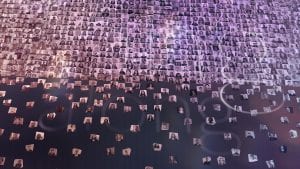
The video’s goal was to include as many faces of singers as possible.
“It’s a lifeline; he absolutely loves it,” Stukart said of her African student. “I love learning about his family and how they’re doing. It’s a great learning opportunity for me, too.”
With the virtual choir, she recorded video on her iPhone in May. The music was free to download and she had four weeks to learn her part. Stukart did about 12 takes to get her part right, and uploaded her video to the site.
“And what was really nice was, he would hold different master classes before the videos were due,” she said. “He would have a master class, on YouTube Live. He included his wife, who’s a singer as well.”
He talked about his thought process behind each part and his wife would do a warmup. “You’d think, I’m warming up with Eric Whitacre and his wife, all over the world and the globe, just in the comfort of your own home,” Stukart said. “That was really cool.”
Putting together a virtual recital for her students last month, she could identify with the time and intensity of assembling a virtual choir of over 17,000 videos. Like singers did, her flute students recorded themselves at home, and she compiled a two-hour video of their pieces, including photos of them and their pets. She estimated spending 45 hours working on it.
“Sing Gently” inspired Stukart to return to singing in choir, whenever that may happen again.
“Being an instrumentalist, there is something special about a choir. It’s a multitude of things – it’s the words being spoken and sung,” she said. “It’s so much in instrumental music, everything is kind of about camaraderie and collaborating, but in a choir, I’ve always witnessed people – there’s just a joy. In instrumental music, you get that, but it’s such a competitive field.”
“I hope that we’re able to return to singing in groups soon,” Stukart said. “I’ve toyed with joining some groups, but with my work schedule, it’s really tough. I teach most evenings and most choirs rehearse in the evenings.”
In the before times, Miss America
Before the pandemic, she got another major thrill by attending the Miss America ceremony last December in Connecticut, to support Miss Illinois 2019, Ariel Beverly (an East Moline native who studied flute with her).
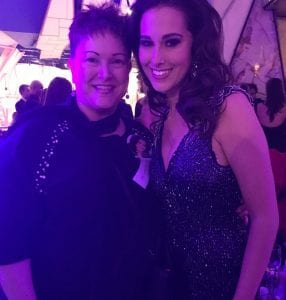
Lynne Stukart with Ariel Beverly, Miss Illinois, at the Miss America ceremony in December.
“She had an awesome time. It was truly one of the best experiences I’ve ever had, to go see somebody I’ve known since 6th grade being a grown woman who’s trying to change the world,” Stukart said. “It was one of those trips that was life-changing, because of the people I met. And again, it’s music, brings people together.”
Beverly (an art teacher and 2017 Illinois State alum) sang at the pageant, and Stukart was very impressed. “She did an amazing job; it was pretty stunning. She’s got great stage presence and she hopes to keep doing some pageants.”
The event, held at the Mohegan Sun Casino and aired on NBC, was the first time since 1921 that featured contestants from the Quad-Cities at the same time. Miss Iowa 2019 is Bettendorf native Emily Tinsman. Like Miss America, Virtual Choir 6 celebrated the talents of a wide variety of people, joining together in unity.
“It’s amazing to think that the Virtual Choir started as a simple experiment some ten years ago. We have all known its special purpose over that decade – joining people from around the world through music – and it has brought us particular comfort this year,” Whitacre said at virtualchoir6.com. “That said, we all look forward to the day when we can safely make music together, in person.”
The piece will be available on all digital music platforms Friday. July 24.









